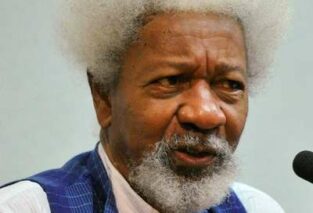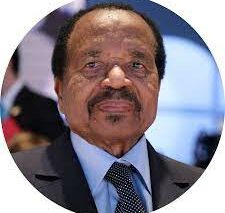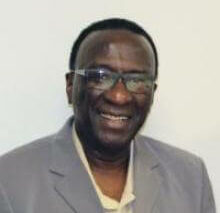The Justice and Peace Commission of the Archdiocese of Bamenda has been striving to bring peace, justice and reconciliation to crisis-stricken areas of the Northwest Region of Cameroon where inter-village and inter-tribal conflicts are recurrent. It has also scored successes at the level of individuals by rescuing victims of human trafficking from their ordeal and successfully bringing charges against a notorious human trafficker and landing her in jail. Women and children, the principal victims of human traffickers, hold center stage in the Commission’s activities. Laura Anyola Tufon, who heads the Bamenda Archdiocesan Justice and Peace Commission, and is also a member of Cameroon’s National Commission on Human Rights and Freedoms, tells us more about the activities of the Justice and Peace Commission of the Archdiocese of Bamenda.
Your Commission is fast gaining a reputation throughout the country for its robust activities in the area of conflict management in the Northwest Region. Tell us about your activities.
The Justice and Peace Commission of the Archdiocese of Bamenda works to defend the weak, the poor and the marginalized because these are people who are usually not aware of their rights and tend to resign themselves to their fate. Our work, however, is not limited to this class of people alone since all is not about material and physical strength but also about transforming the mindset of people to treat others with dignity. No individual is more human than another simply on the grounds that he or she is stronger or richer. We have realized in the course of our work that even those who act strong and with impunity are, in fact, feeble and weak in mind. At times such people even suffer more from their actions than those considered weak.
Our Commission works in tandem with other Justice and Peace Commissions at the national, regional and continental level. Like all Catholic Peace and Justice Commissions, we take our orientation from the Pontifical Council for Justice Peace of the Universal Church in Rome. Our work is inspired by the Gospels and the Social Teaching of the Church.
We also work in the field of confidence building. Over the years, we have been able to build confidence in people, communities and some social structures, and that is what has given us the reputation we seem to enjoy now. We touch on very sensitive issues and undertake meaningful projects that touch the very essence of life by working for justice, peace building and sustainable development.
At the moment, we are focusing attention on the Post Synod message of the Church on the theme “The Church at the Service of Reconciliation, Justice and Peace”. Our aim, of course, is to see how we can translate the recommendations of the Synod Fathers into reality at our local level.
What part of the Synod Fathers’ message relates directly to Justice and Peace?
The entire message relates to justice and peace and all that revolves around them (conflict resolution, peace building, post-conflict reconstruction, reconciliation, respect for human rights, fight against human trafficking, etc). When we talk of reconciliation, for example, we examine ways and means of bringing the Gospel message of reconciliation to the practical level of our social, cultural or religious realities. If two people from neighboring villages fight over a piece of land, which is so common in our region of the country, and if some people are killed in the process, the challenge becomes how to bring those parties around the table and enable them talk it out. If nothing is done, it may seem for a while that there is peace but resentment is simmering below the surface. The children listen to their parents expressing frustration and resentment against the other parties and they themselves grow up knowing that the members of the other village are their enemies, and they, in turn, will be tempted to carry this enmity to the next generation.
You mention inter-village and inter-tribal conflicts that are so recurrent and widespread in the Northwest Region of our country. What accounts for such frequent skirmishes between neighbouring villages and tribes?
You’re right, the Northwest Region of our country has gained the unflattering reputation as the hotbed of inter-village and inter-tribal conflicts. You’ll recall that not so long ago, the Bali Nyonga people clashed with their neighbours, the Bawok, and homes were looted and destroyed, and thousands of villagers became internally displaced persons. That was sad to see. Around the same time, the people of Oku were sparring with their neighbours from Mbessa. No sooner were those skirmishes brought under control than another one flared up in Ndop between the Balikumbat and Bambalang. You ask what the main cause of these frequent conflicts is; well, there may not be just one reason, but the principal one is land. Arable land is becoming more and more scarce as the population grows and exerts pressure on the available land. The population survives mainly on subsistence agriculture and when people feel, rightly or wrongly, that their neighbours are encroaching on their own part of the land, tempers flare up and before long it is open warfare.
One would normally not expect an organ of the Church, like the Justice and Peace Commission, to intrude into a domain that seems reserved exclusively for the State; after all, maintaining law and order falls squarely on the shoulders of government, not the Church.
You’re right that the State is the principal police of law and order. However, the Church is, in a way, a partner with the State in ensuring that peace, justice and reconciliation reign in our land. That said, let me hasten to add that it was the State that came to us to help resolve the said conflicts. In the case of the Bali Nyonga and Bawok land dispute, the Senior Divisional Officer (SDO) of Mezam Division at the time, who was a Catholic and had been a member of the Justice and Peace Commission of the Diocese of Nkongsamba, requested permission from the Church authority for the Justice and Peace Commission of our Archdiocese to work hand in hand with the administration to resolve the recurring conflict between the two villages. That is how our Commission, with the permission of the Local Ordinary, came to work with the public authority to resolve that conflict.
Are you satisfied that peace has now come to stay between the Bali and Bawok villages?
We hope and pray that peace and reconciliation are now the watchwords between those villages. Let me hasten to add here that reconciliation is a process, not an achievement. We don’t fold our arms and say that peace and reconciliation have been achieved once and for all; no, we continue to educate the people on how to respect members of the opposite side, to see them, not as enemies, but as brothers and sisters, children of the same God, who created us all in his own image and likeness. We avoid laying blame on any party or treating one party as bad and the other good. We strive for a win-win resolution of the conflict, wherever and whenever possible.
No sooner had you resolved the conflict between the Bali Nyonga and Bawok villages than another one flared up between the Balikumbat and Bambalang villages in Ndop and again the Justice and Peace Commission was on the ground. What happened In Ndop?
We’re still talking of land conflict here. It’s rather unfortunate that many people tend to label the Bali man as a warrior. This is an unfortunate stigma (words that kill) in conflict management. When you label a party to a conflict with such a negative stigma, they immediately go on the defensive, making reconciliation difficult. Our approach is to downplay any negative reference to any party and to help parties see each other as human beings, not as killers or victims. That is why when we go to the field, we assess the situation, find out the immediate as well as the long term causes of the conflict and then notify the administration of our finding. It is they who have the authority – the police, the army — to take action as deemed appropriate. Even though the administration has the powers to act on its own, it still needs the support of civil society organizations, like ours, and the Church to reassure and calm the people involved.
In practical terms, how do you go about the reconciliation process in such conflict situations, especially when the protagonists have been harbouring resentment against each other for long periods of time?
One of the first things we do in peace building or conflict resolution is to create space where the protagonists in the conflict can meet and vent out their feelings. Such a space, preferably on neutral territory, enables them to talk first before any action is taken to resolve the problem. For example, if the administration steps in with its forces of law and order and decide that they are going to demarcate the boundary between two villages in conflict, without first creating space for them to talk and let out their anger, they will merely be postponing the conflict which, sooner or later, will flare up again. I believe the administration is aware of this and that is why they usually stay in the background as much as possible, leaving the way clear for us to calm down the tempers, create space for people to talk before taking any action. They keep their forces in the background and this eliminates the fear people may have to vent out their feelings freely. We thank God that we were able to create space for the Bali Nyonga and the Bawok people as well as the Oku and Mbessa people to express their feelings openly. Later, they were able to shake hands with each other. We hope the same approach is taken in the case of the Balikumbat-Bamalang issue but we have to be aware that each case is different and should be addressed on its own merit. We must constantly keep in mind that peace building is not an achievement but rather a culture which takes into consideration the fact that community relations change according to the circumstances.
Your Commission is not only involved in resolving inter-village and inter-tribal conflicts; you also do much appreciable work at the level of individuals, especially the most vulnerable: women and children. Tell us about your work in that area.
Yes, women and children form a very vulnerable and often neglected stratum of our society. Human traffickers, who are particularly active in our region of the country, know it and openly prey on our women and children. It is thanks to the relentless efforts of our Commission that the very first case of its kind in our country was brought to a court of law against a human trafficker, who was condemned and is now serving a jail term in Bamenda. She is a Cameroonian woman who trafficked a young girl and her baby from Nigeria. As we began our investigation into the matter, we learned that the woman in question was a hardened human trafficker, who had been involved in that business for several years. No one had ever challenged her until the Justice and Peace Commission came onto the scene. We worked together with the Franciscan Sisters, who run the Paul VI Pastoral Center in Mendankwe, to rescue the said girl and her son from the clutches of the trafficker. It was an expensive investigation and it took over a year before the matter could come up for hearing. We’re glad the trafficker is now in jail and the girl and her son are safe back to their home country.
I would imagine that the victims of human trafficking are usually poor and helpless. How do they ever get legal assistance, given that such services are not always cheap?
You’re right. Many of these people are poor and are usually not aware of the assistance they can get from the law. They are ignorant about the law on child trafficking and we are in the process of educating them on their rights. We find out who needs justice and we educate them on what to do to have justice rendered them.
You mentioned the cost of legal assistance; that is a thorny issue indeed. We have limited financial resources but we’re glad to say that more and more lawyers are becoming sensitive to the needs of the poor and the marginalized in our society and are ready to take up such matters charge free. At times the Commission carries out the case work when it is absolutely necessary in order to assist those who cannot afford even the basic fees for filing a matter in court. We have taken up such cases before and have had spectacular successes defending the poor and the marginalized. We’re happy the courts of the Northwest Region are cooperating with us in many of such cases.
One thing is certain, though. If we have alternative conflict resolution mechanisms in place, the work load of the judges will be considerably reduced. There are cases that come to court where out-of-court and amicable solutions would do. If more structures, like the Justice and Peace Commission, existed, they would easily intervene and resolve such conflicts before they go to court. Our aim is to achieve reconciliation at every level; help people to live in peace with themselves and with their neighbours.
You also help educate couples in marital matters. Tell us about your work in that area.
Yes, we are very concerned about women who are ignorant of their rights and obligations, especially in marital matters. Take the case of a woman who has contracted a traditional marriage with a man and has been living with him for well over twenty years. In the eyes of the law and of the Church, she is not married. In the event of a breakdown of this quasi-marriage relationship, as we see happening so often, such a woman has no where to go for redress. The courts do not recognize her as a married woman, since no legal document exists to prove that she is legally married, and the Church does not recognize her marriage either, since no Church document bears witness to her marriage to the man. She ends up the loser. The man, for his part, walks away, usually with another woman, much younger than her. That’s the classic example of what happens to many women in our country today. Our role, as the Justice and Peace Commission, is to educate the woman and the man as to the importance of contracting their marriage before State and Church authorities. The future of many women is ruined because of ignorance in such matters. Our Commission is out to educate our people because the stability of the home is one of our primary objectives.
Douala, August 14, 2011


